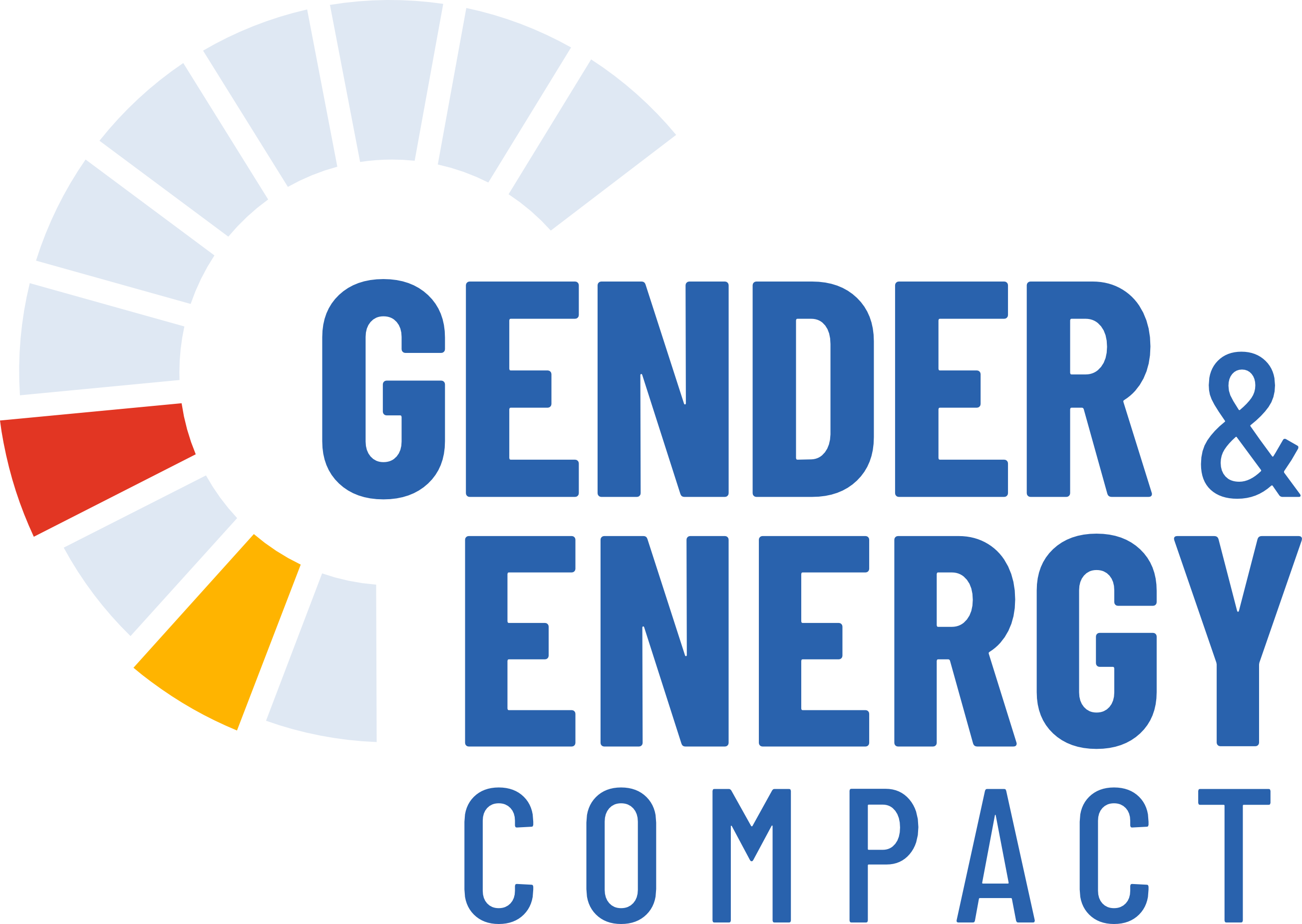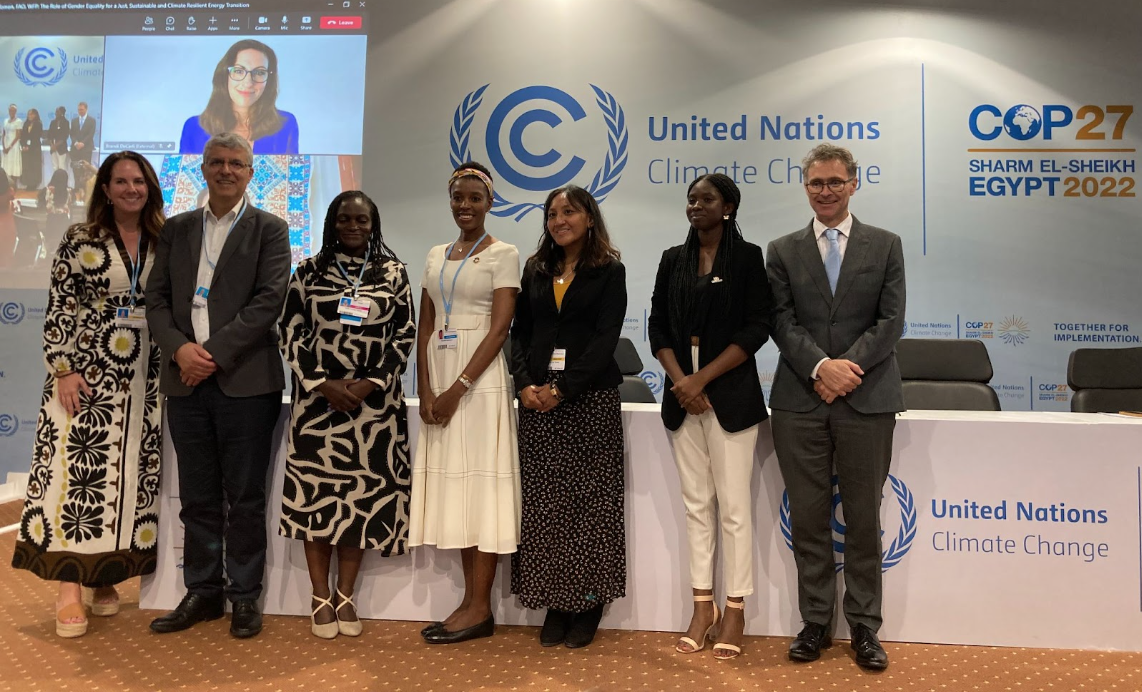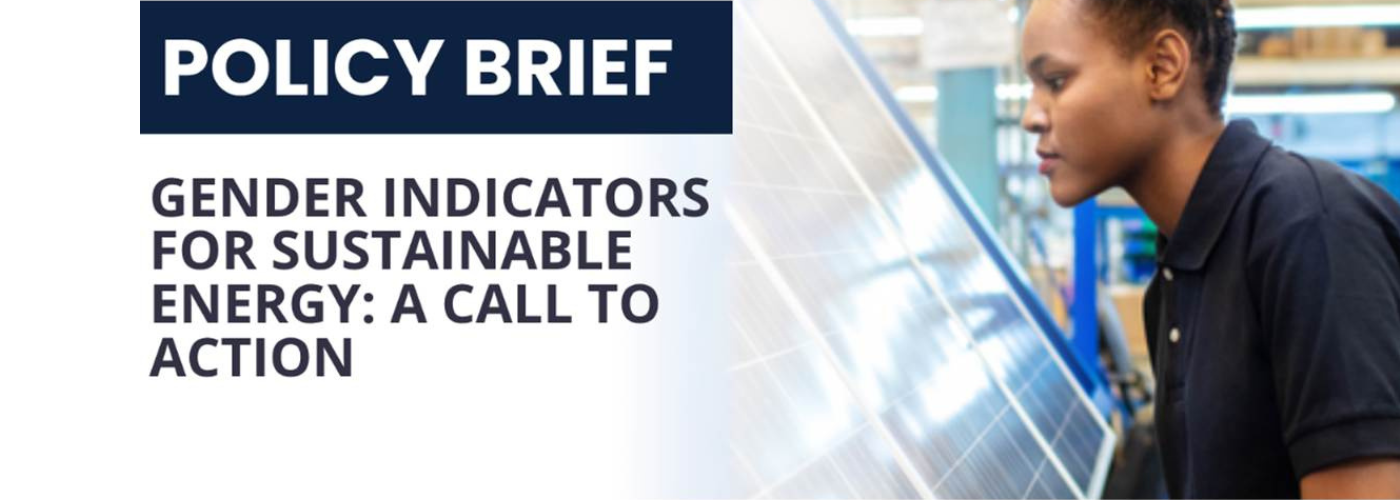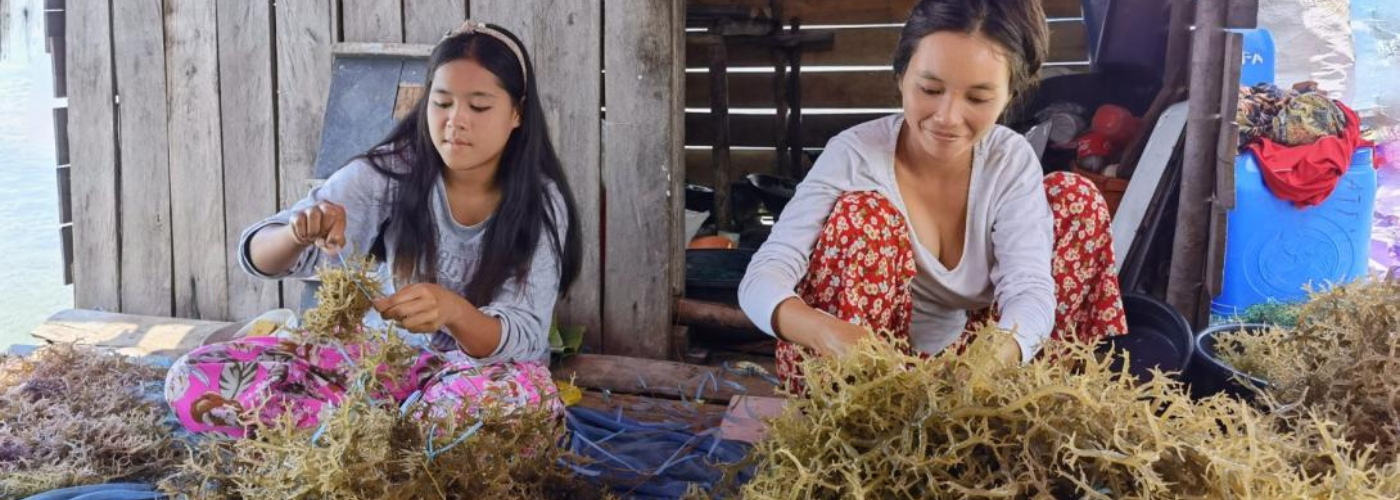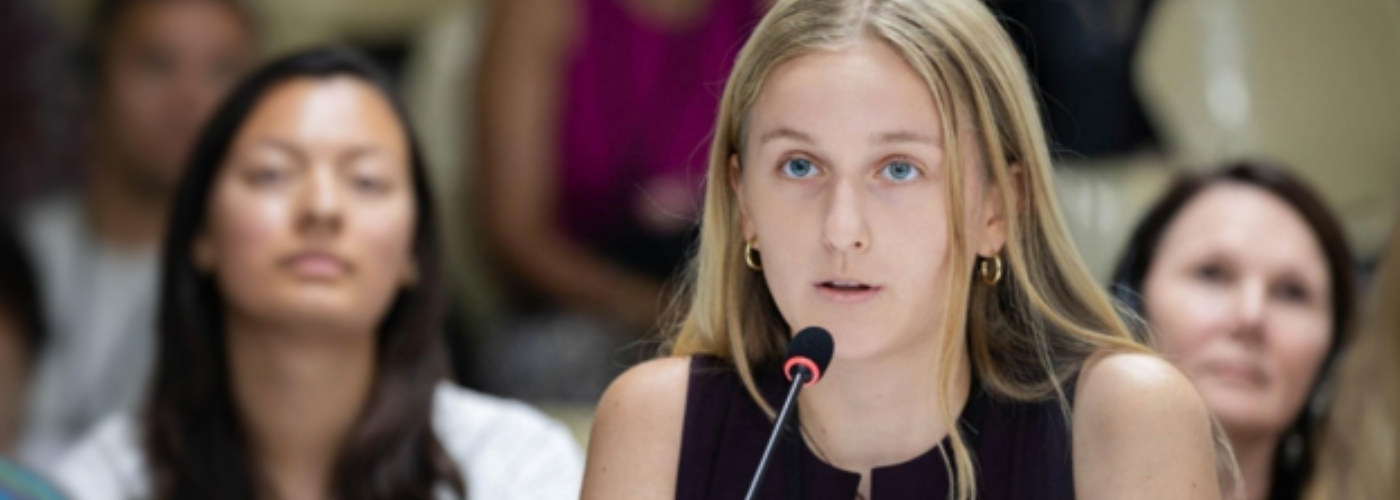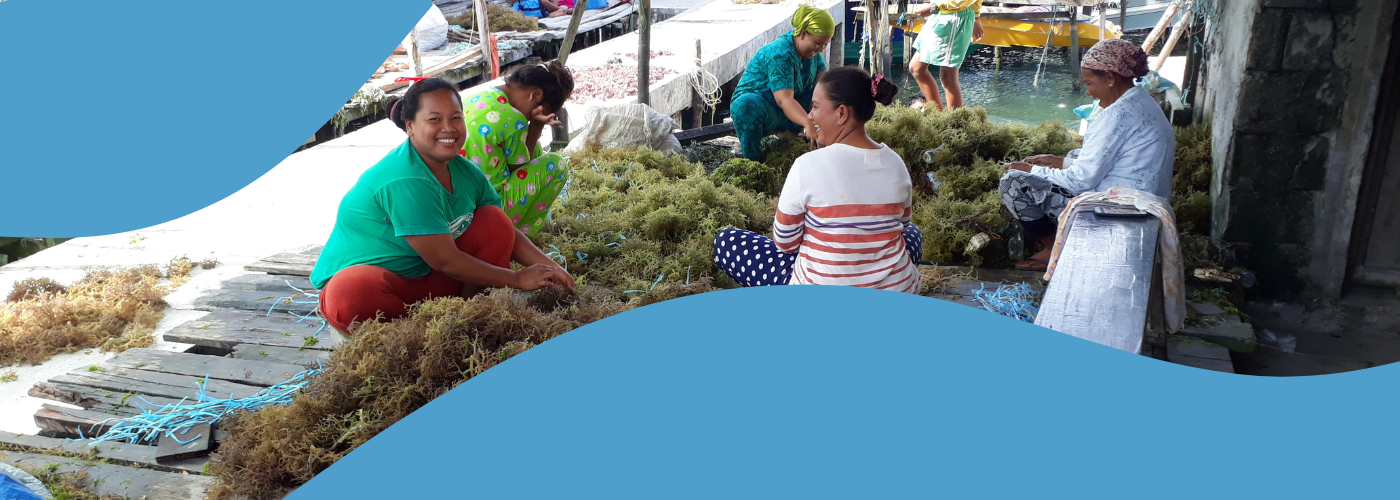“Bridging the gender divide is not only a matter of justice for women and girls. It’s a game-changer for humanity. Women’s equality is essentially a question of power. We must urgently transform our male-dominated world and shift the balance of power, to solve the most challenging problems of our age. It means women [to be] fully represented and making their full contribution, everywhere”
UN Secretary-General Antonio Guterrez in his speech at the 76th UN General-Assembly a few weeks before COP27 kicked off.
The impacts of climate change we have witnessed so far reinforce and even exacerbate the already existing gender gaps. Women, youth and marginalised communities are disproportionately impacted by climate change, and hence bear the brunt of inaction and often have no space or voice to participate in, lead and benefit from the energy transition.
We need a space to discuss gaps and inequalities and to propose critical solutions to advance a gender-just energy transition.
With this in mind ENERGIA, UNIDO and GWNET, together with strategic partners and members of the Gender and Energy Compact Coalition came together at the 27th Conference of the Parties of the UNFCCC (COP27) to highlight the importance of gender equality, gender-smart financing and gender-transformative policies in building a climate-just energy future.
What came out strongly from our discussions was the intersectionality of gender equality with the SDGs, the limitations that financial mechanisms pose to the full participation of women and girls in the energy transition, the importance of access to resources to support equality and inclusion, and the critical need for multilateral partnerships and commitments at a local and national level to ensure a just and equitable energy transition.
Here are some highlights of the Gender and Energy Compact Coalition at COP27:
Side-Event: “The role of gender equality for a just, sustainable and climate resilient energy transition”
On November 12th, UNIDO jointly with the Food and Agriculture Organization (FAO), World Food Programme (WFP), and UN Women, came together to explore the gender dimensions of the water-energy-food nexus, featuring an impressive line-up of speakers from the global north and south, from private and public sector, academia, civil society and international organizations.
During this session, speakers explored the nexus dimensions of gender equality (SDG5) and universal energy access (SDG7), with climate action (SDG13), food security (SDG2), and clean water and sanitation (SDG6), demonstrating the need to include women at all levels: from sustainable farmers and entrepreneurs to policy makers and partners for climate action.
During his opening remarks, Tareq Emtairah, Director of the Department of Energy and Decarbonizaton at UNIDO, emphasized that “equal access to power and resources is at the heart of this issue…without equal access to power we will not make progress on gender equality and a just energy transition”.
Setting the Scene for the event, Elizabeth Wathuti, Environmentalist, Climate Activist and Founder of the Green Generation Initiative shared how she witnesses in her home-country Kenya that severe droughts and malnutrition impact womens’ and childrens’ lives disproportionately: “Wells are collapsing, women have to walk further and further to fetch water and collect firewood and thus girls and women become more vulnerable to gender based violence. Yet women are the first responders and thus closing gender gaps in education can help countries to better adapt to climate change”.
These powerful remarks paved the way for a dynamic panel discussion, which looked at the core issues hindering progress on equality and justice in the water-energy-food nexus, while also looking at the opportunities for closing the gender gap through a just and equitable energy transition.
Panelists included Kosar Bano, Gender and Adaptation Specialist at the International Centre for Integrated Mountain Development (ICIMOD) who stressed that South Asia and the Hindu Kush Himalaya (HKH) are among the regions that are most vulnerable to the impacts of climate change. She also reiterated that ‘women and girls are more vulnerable to climate change and its impacts, and their adaptive capacities are limited. Climate change is further widening the gender gap and worsening existing social inequalities due to women’s inadequate access to and control over productive resources, and their limited mobility and voice in decision making.
Joy Reyes, Climate justice lawyer at the Manila Observatory, confirmed that women living in poverty are most vulnerable to water food-energy insecurities and also dived into the specific needs of young women and girls.
The leadership role of the private sector was highlighted by Brandi di Carli, Founding Partner of Farm from a Box, which is an all-in-one toolkit for outdoor, regenerative farming. She mentioned that “Uplifting women globally may be the single most effective solution towards building a climate resilient future across all dimensions of life: from our health and wellbeing to economic growth and political stability”.
Jillene, Chief of Staff at the Clean Cooking Alliance emphasized the essential role of clean cooking in the nexus while Gareth Phillips, Climate finance Division Manager at the African Development Bank (AfDB) elaborated on the role of international financial institutions.
Stella Funsani Gama, Deputy Director of Forestry, Ministry of Natural Resources, Energy and Mining, Malawi and representative from the LDC Group drew the attention to COP27 negotiations in calling out that for a least developed country like Malawi: “We are energy-insecure, we are food-insecure and water insecure”.
Panelists included Elizabeth Nyamayaro, Special Advisor to the World Food Programme stressed that “Women are not only vulnerable … they are also the solution and there can be no development if women are left behind”.
All speakers agreed that to be just and sustainable, the energy transition must include and empower women. Our climate and development goals are simply not possible until we provide women equal opportunity to lead, participate in and benefit from sustainable energy, for instance by providing access to sustainable energy, affordable, accessible clean cooking solutions to the billions of women currently without.
Watch the event recording here.
Side-Event: “Where is the money for a gender-just energy transition”?
The triple threat of the climate crisis, COVID pandemic and deepening inequality demands urgent, bold responses, and can only be successful if accompanied by adequate financial resources. However, the the report Energizing Finance: Understanding the Landscape 2020, produced by Sustainable Energy for All (SEforALL) and the Climate Policy Initiative (CPI), found that financing for energy projects with a specific gender equality objective remains a small share (2-11 percent) of total official development assistance (ODA) to the energy sector. Finance for energy projects with a gender equality objective is also highly concentrated amongst a few donors — 93 percent of total finance reported is from only 10 government agencies.
That is why on 14th November, the Gender Energy Compact Coalition hosted a session at the SDG7 pavilion in which panelists explored the current financing landscape for gender-equality for a just and inclusive energy transition and how adequate financial resources can materialize to reach women and meet their practical as well as strategic needs.
Olasimbo Sojinrin, Chief Operating Officer at Solar Sister opened the panel discussion highlighting that women entrepreneurs at the last mile struggle to access finance. Nevertheless, although women and girls are particularly vulnerable to climate change and suffer from energy poverty, they are also key agents of change with the capacity of bringing in innovative, bold solutions for climate action.
Therefore, we were honoured to host a panel of government representatives who agreed that donors need to step up since never before a clean energy future has been so clearly linked to a more just, inclusive path toward development for all people and the planet.
Benedikt Höskuldsson, Special Envoy for Climate at the Ministry of Foreign Affairs of Iceland recommended that donors should request that funds be implemented with a gender lens and also emphasized the need for collaboration and partnerships to make effective use of funds and create catalytic change.
Faith Wandera-Odongo, Senior Deputy Director of Renewable Energy at the Ministry of Energy of Kenya shared that Kenya has a Gender Policy in Energy which is the first of its kind on the African continent. However, although policy is an essential first step, the country struggles to implement the policy due to a lack of adequate funding.
Hans Olav Ibrekk, Special Envoy, Climate and Security, Section for Energy, Climate and Food Security at the Norwegian Ministry of Foreign Affairs we need to make sure that ‘we include more men into the discussion’. Moreover, he stressed that ‘we need to move from talk to action’, since we never needed more urgent action to mitigate and at the same time adapt to climate change as now.
Technical experts that joined the discussion confirmed that despite the wide recognition that supporting gender equality contributes to sustainable energy for all and vice versa, gender-smart climate finance for a just, inclusive and sustainable energy transition lacks behind.
Dabira Abiola-Awe, Ventures and Capital Campaign Associate at Student Energy highlighted that funding is an issue for most young entrepreneurs, and even more for young women. She also called for a change of the ecosystem and for more capacity building for young women.
Gareth Phillips, Climate finance Division Manager at the African Development Bank (AfDB) agreed on the need for capacity building and mentoring. He also stressed that financial mechanisms tend to be gender-blind, and fail to include the needs of women, especially poor women living on the frontlines of climate change and energy poverty, with unmet development needs and the burdens of whole communities on their backs. He highlighted that there are ‘very few, if any sources, that are sustainable and reliable that are channeled to the projects that are implemented by women and youth, many of them small adaptation projects’. However, the current financing landscape concentrates on large amounts of money. Therefore, he calls for a change of architecture of the financing landscape.
Ellen Brookes, Climate Change Executive at the British International Investment stressed that investing in women makes economic sense and that we also need the private sector to invest gender-smart, pointing to the Gender-Smart Climate Finance Guide for further information.
Speakers agreed that we need to support gender equality and women’s empowerment at all levels: women entrepreneurs, women’s access to energy at the last mile, women in the workforce, as decision makers, gender responsive energy/ climate policies, gender-responsive public procurement. They emphasized that the need for targeted funding for a gender-just energy transition has come now. They closed with the following key recommendations:
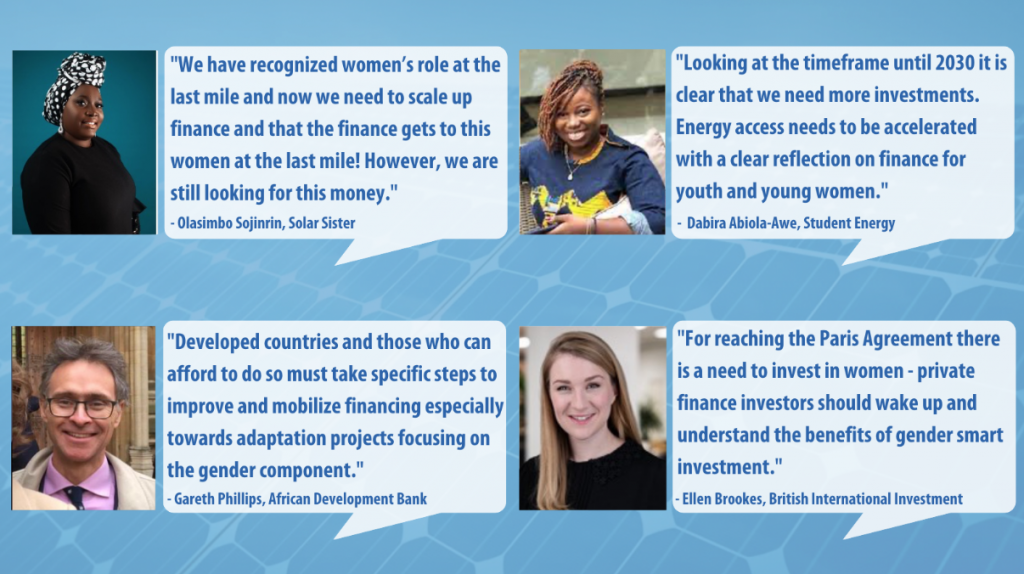
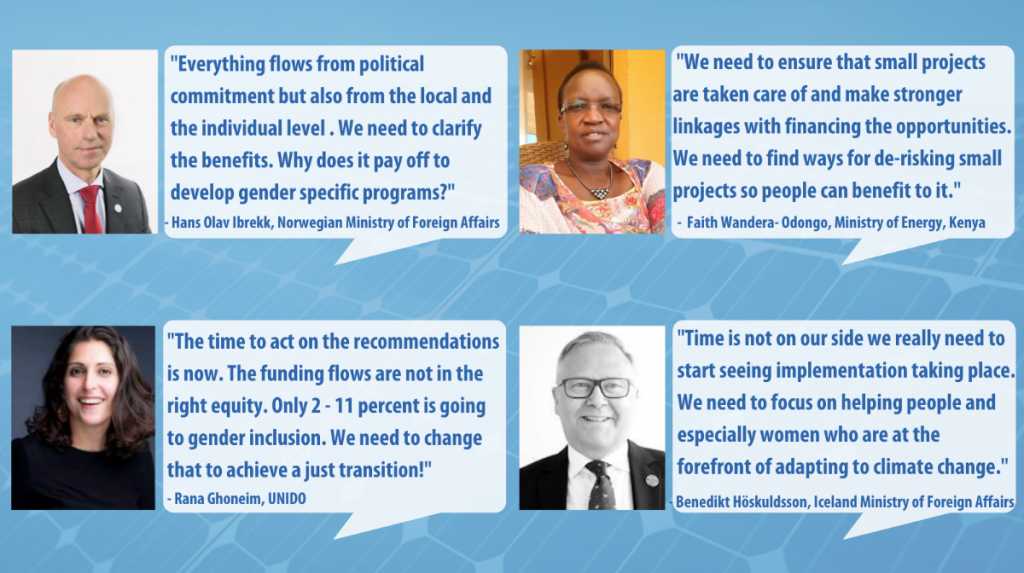
In closing the session Sheila Oparaocha Executive Director of ENERGIA and Irene Giner-Reichl, Founding Member and Senior Advisor, Global Women’s Network for the Energy Transition (GWNET) highlighted that a gender responsive energy transition empowers all people including men and youth and pointed out that financing needs to be further strengthened within the gender agenda through further work on legal and regulatory frameworks that sets the framework for this inclusion.
Sheila closed by emphasizing the role of partnership: “We need urgent transformative partnerships that leave no one behind. Also we are not leaving men behind in a just energy transition: economically, socially and financially. In our coalition of the Gender and Energy Compact we have 10 governments and we are looking forward to others joining us on this journey”.
Other Events at COP27 and Outlook for 2023
The Gender Energy Compact Coalition engaged in multiple other events at COP27 including through the African Development Bank, WiSER, UNFCCC, SDG7Pavillion, and many more.
This shows the power of collaboration and partnerships and that jointly we can raise awareness on the importance of closing gender gaps in energy amongst multiple stakeholders creating catalytic change.
During a fireside chat at the SDG7 Pavilion Sheila Oparaocha highlighted that ‘Out of all seventeen SDGs, SDG7 is one of only six that has no gender-specific indicators, according to the United Nations Entity for Gender Equality and the Empowerment of Women (UN Women). This enormous gap poses a barrier to the achievement of a just, inclusive, and equitable energy transition and has to be addressed. Hence, we need urgent action to raise awareness and to showcase initiatives that are working to collect and expand data on gender and energy as good practices that can be replicated and scaled up’. Therefore, the Gender Energy Compact explores the possibility to work on enhancing availability of gender-disaggregated data in the energy sector jointly with partners.
The discussions at COP27 have been fruitful, but in 2023 we need to move from talk to action putting women and youth at the center of climate justice and a just, equitable energy transition.
Find the full list of COP 27 side events here.
